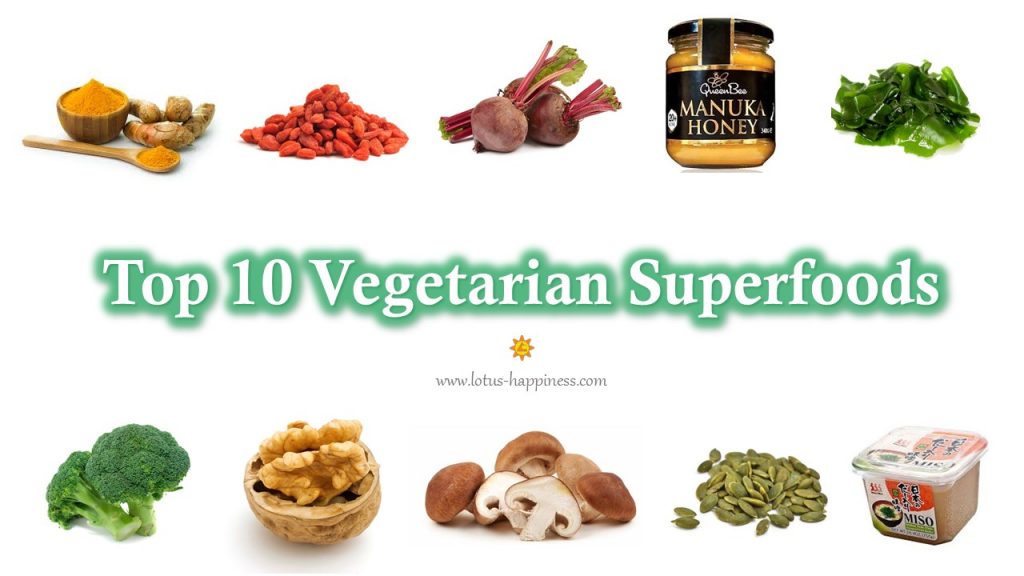
Top 10 Vegetarian Superfoods
According to the Mahaparinirvana Sutra in which the final teachings of the Buddha are expounded, the Buddha insisted that his followers should not eat any kind of meat or fish. While not all Buddhists are vegetarian, being a vegetarian is a worthy choice that will contribute to your overall well-being and spiritual cultivation.
Being a vegetarian brings abundant of benefits to our health. Apart from the ethical conscience of killing animals, vegetarians enjoy consuming diet rich in fiber and minerals such as potassium, magnesium and phytochemicals, and less saturated fat and unhealthy cholesterol. This often results in vegetarians having lower cholesterol, being thinner, having lower blood pressure, and reduced risk of heart disease.
The following are top 10 vegetarian superfoods to turbocharge your health and well-being:
#1 – Turmeric
Turmeric (Curcuma longa), the bright yellow of the spice rainbow, is a powerful food and medicine. It has long been used in the Chinese and Indian systems of medicine as an anti-inflammatory agent to treat a wide variety of conditions, including flatulence, jaundice, menstrual difficulties, bloody urine, hemorrhage, toothache, bruises, chest pain, and colic.
Moreover, according to research, turmeric can save the brain from fluoride poisoning and improve cognitive health. It has the ability decalcify the calcium around the pineal gland (known as the “third eye”), for those who wish to further advance spiritual growth and cultivation.
#2 – Goji Berry
Goji berry, also known as wolfberry, is one of the most renowned food in traditional Chinese medicine. It is commonly used to protect the eye health and detoxify the liver. Considered as “superfood berries” by many health experts, goji berry provides high levels of antioxidants and nutrients to improve immune system and fight cancer. It will also boost energy, lift up mood, stabilize blood sugar and promote fertility.
#3- Beet Root
Beets are high in immune-boosting vitamin C, fiber, and essential minerals like potassium (essential for healthy nerve and muscle function) and manganese (which is good for your bones, liver, kidneys, and pancreas). Beets also contain the B vitamin folate, which helps reduce the risk of birth defects.
#4- Manuka Honey
Manuka honey, produced in New Zealand by bees that pollinate the Manuka bush, is one of the most unique and beneficial forms of honey in the world. The nutritional content of Manuka honey is up to 4 times that of normal flower honeys; this is what is called the Unique Manuka Factor (UMF). Benefits of Manuka honey uses range from healing sore throats, digestive illnesses, acne and eczema to curing Staph infections and gingivitis.
#5 – Kelp
Kelp has high levels of natural iodine, which is essential in regulating our thyroid hormones and therefore our metabolism and energy levels. Other minerals include salt, iron, potassium, phosphorus and calcium. The lead vitamins in kelp are vitamin A and niacin. Iodine is a mineral that is not commonly found in many food sources, be sure to include kelp or seaweed in your repertoire of healthy food.
#6 – Broccoli
Broccoli is an excellent source of vitamin K, vitamin C, chromium and folate. It is a very good source of dietary fiber, pantothenic acid, vitamin B6, vitamin E, manganese, phosphorus, choline, vitamin B1, vitamin A (in the form of carotenoids), potassium and copper. Folate found in broccoli is an essential mineral that could reduce the risk of birth defects.
#7 – Walnut
The shape of Walnuts look like a two hemispheres of a brain with a reason. It is an excellent source of hard to find omega-3 fatting acids, a type of heart-healthy monosaturated fats that are usually found in abundant quantities in fish such as salmon fish. Research shows walnut consumption may support brain health, including increasing inferential reasoning in young adults. Other neuroprotective compounds in Walnut include vitamin E, folate, melatonin, omega-3 fats, and antioxidants.
#8 – Shiitake Mushroom
High level of polysaccharides, shiitake mushrooms are clinically proven to have anti-tumour and immune stimulating properties. Polysaccharides in mushrooms are found to increase immune systems by stimulating the production of various immune cells such as natural killer cells, T-cells, B-cells, neutrophils, and macrophage. High in B vitamins and vitamin D, other benefits include supporting cardiovascular health, improve energy levels and brain function, and reduce inflammation.
#9 – Pumpkin Seed
Pumpkin seeds are found to have good sources of the minerals phosphorus, magnesium, manganese, and copper and a good source of the minerals zinc and iron. The seeds are an excellent source of amino acid tryptophan and glutamate.
Converted from Tryptophan, Serotonin is a beneficial neuro-chemical often labeled as nature’s sleeping pill. With Glutamate used in the synthesis of gamma-amino butyric acid (GABA), an anti-stress neurochemical in the brain, consuming pumpkin seeds helps reducing anxiety, nervous irritability, and other neurotic conditions.
#10 – Miso Soup
Miso is a fermented paste made from soybeans, sea salt and koji (a mold starter). The length of fermentation is between 3 month – 3 years, which produces an enzyme-rich food. Drinking miso soup daily will help in body detoxification, reduces abdominal (waist-line) fats, restores beneficial probiotics to the intestines, reduces risk for breast, prostate, lung and colon cancers, protects against radiation (due to dipilocolonic acid, an alkaloid that chelates heavy metals and discharges them from the body), lower LDL cholesterol and protect against free radicals.











